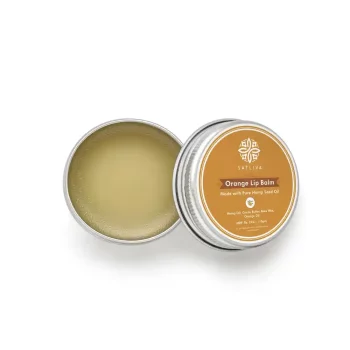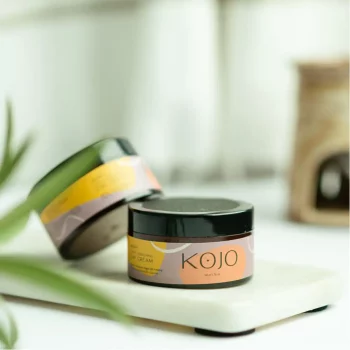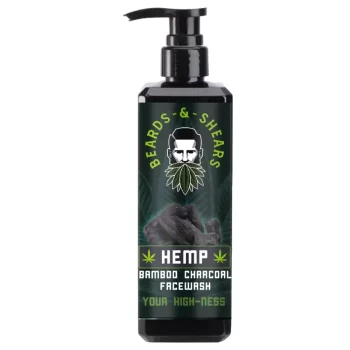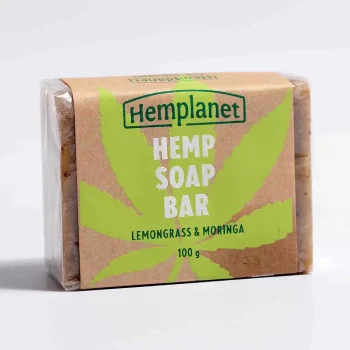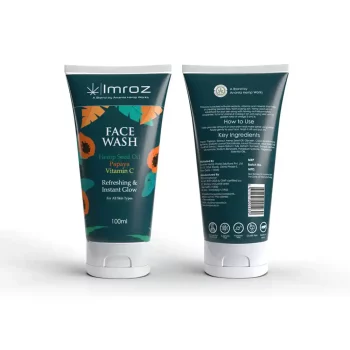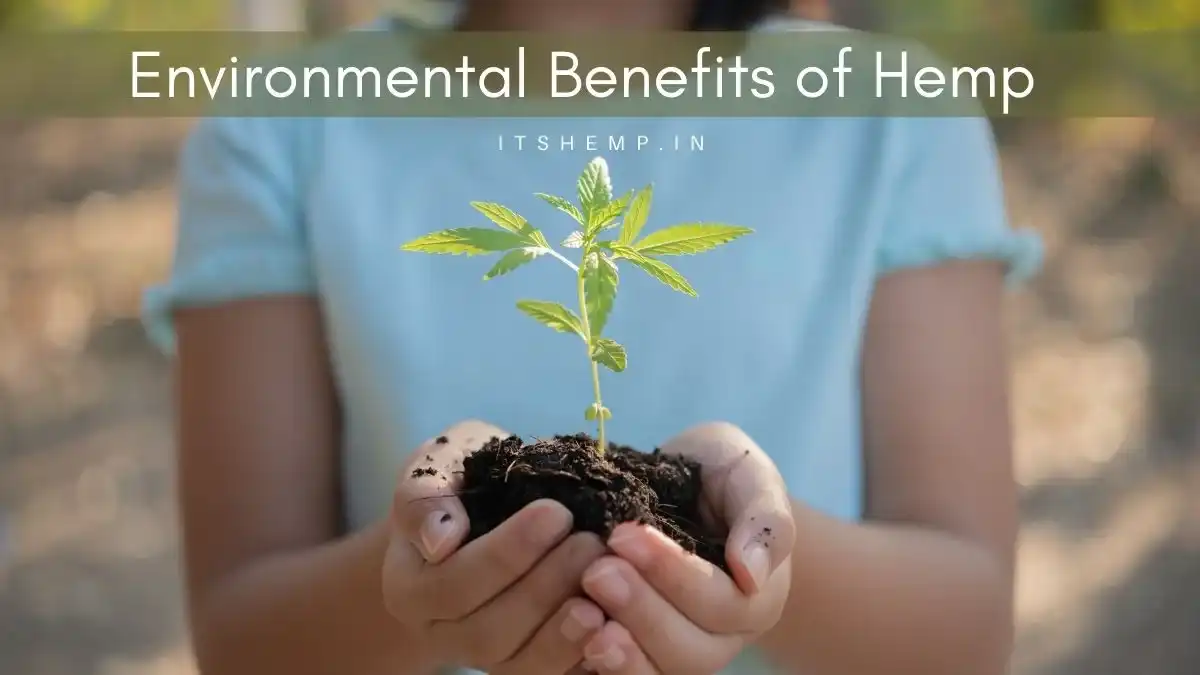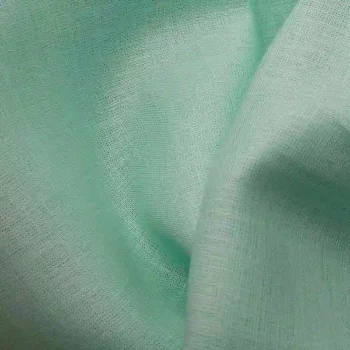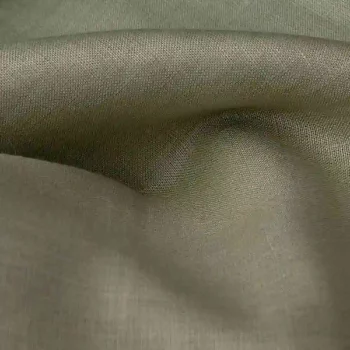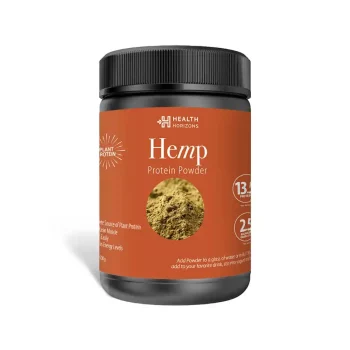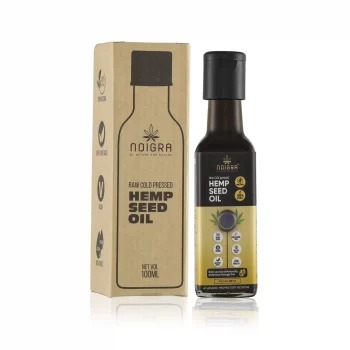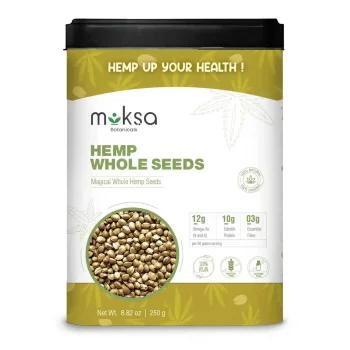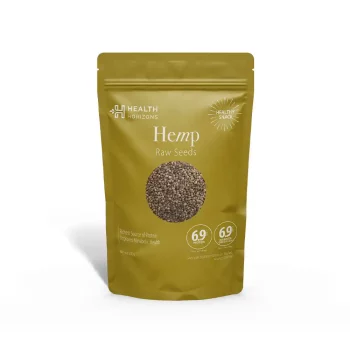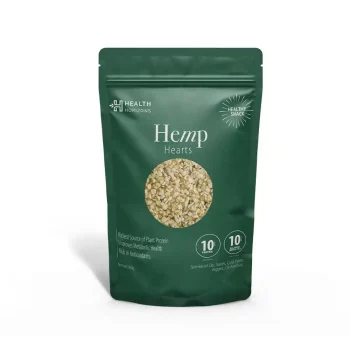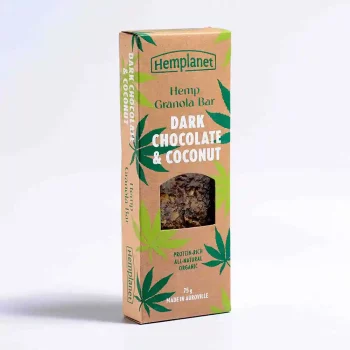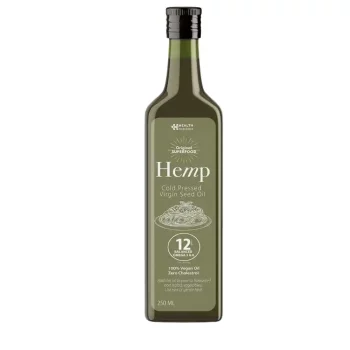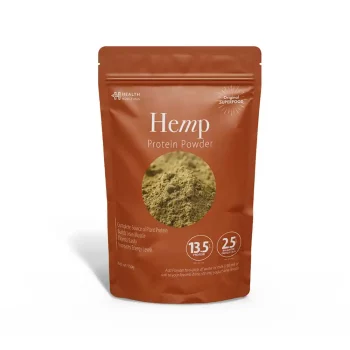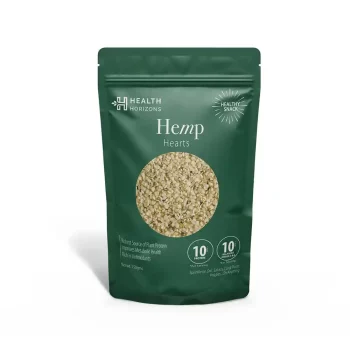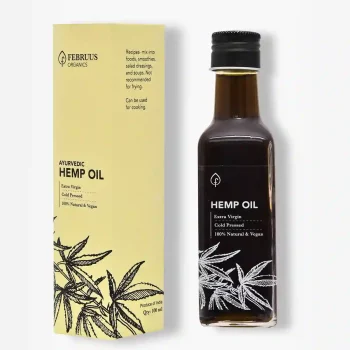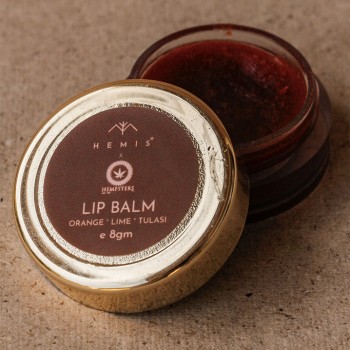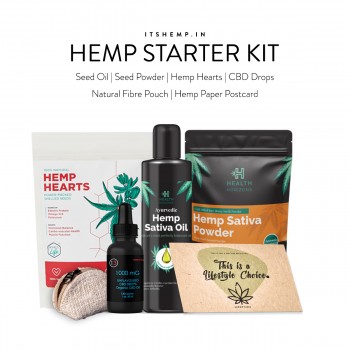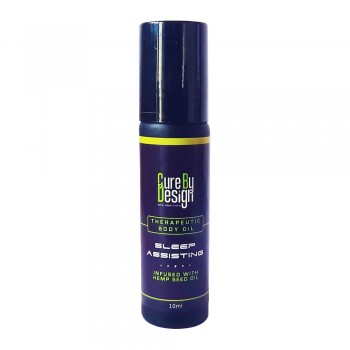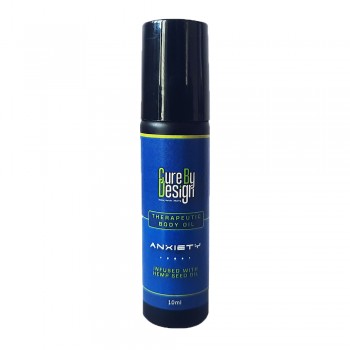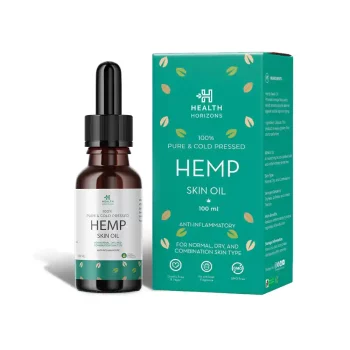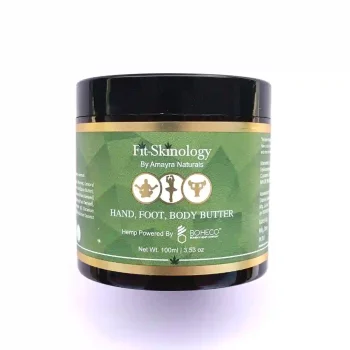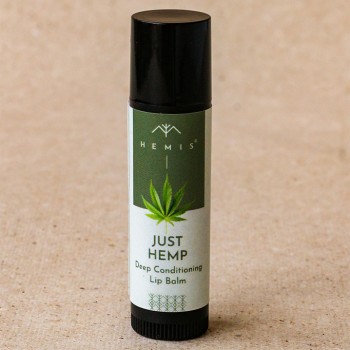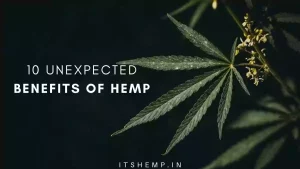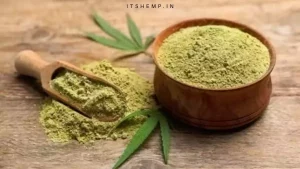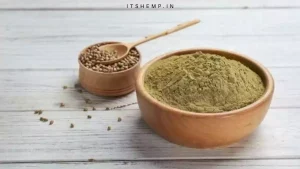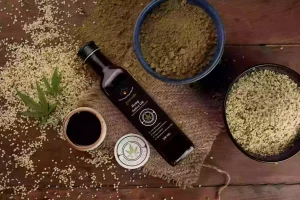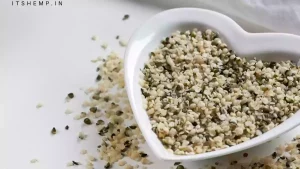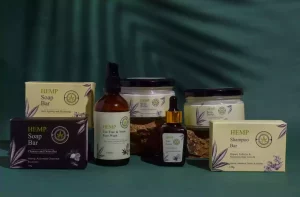Hemp is not the wonder crop for no reason. It offers real, applicable sustainable solutions that we need in the world today. Industrial hemp is a very robust, competitive plant that can out-compete weeds. This is one of the many hemp environmental benefits.
Outline
What are sustainable practices?
Hemp—the Sustainable Crop
Environmental Benefits of:
Growing Hemp
Using Hemp
What hemp products can I buy?
What are sustainable practices?
Sustainability is defined as the ability to maintain a balance of a certain process or state in any system. In recent times, we use the phrase sustainable practices in association with biological and human systems. We express sustainability in human organisation concepts such as eco-municipalities and sustainable cities, and for human activities such as sustainable agriculture and renewable energy.
For humans to live sustainably, it is imperative to use the Earth’s resources at a rate at which they can be replenished—in a way that yields maximum environmental benefits. But as is no surprise, we aren’t currently doing this. Let’s understand what sustainable practices truly mean.
The finest way to define sustainable practices is through the three pillars of sustainability.
Sustainability depends on three independent areas that are equally important—social implications, economic implications, and envrionmental implications.
Social Implications
Sustainable practices must ensure that we always respect global human rights. This spreads over areas such as inequality, poverty, social injustice, fair wages, and other human rights matters. True sustainability occurs when farming and industrial practices always leave a positive social impact.
Economic Implications
The mass adoption of sustainable agriculture has been, for some part, put off by its economic effect. While the benefits of sustainability don’t always translate to swift economic growth, they do prove safe for the environment and mankind. Sustainable practices can only be adopted when they fuel economic development.
Environmental Implications
Sustainability is, more often than not, synonymous with environmental impact. And there is a good reason for this association. The Earth is rich but it only has so many natural resources that we can exhaust. To ensure our survival as a species, it is important to manage them carefully.
Therefore, producers, cultivators, and consumers must pay attention to the impact they are leaving on the environment. It then becomes obvious that we need to adopt renewable energy and sustainable agricultural practices, those that give environmental benefits.
Hemp—the Sustainable Crop
Hemp can alleviate the need for many other mass-produced modern raw materials. We can significantly reduce the large amounts of toxins and waste from the fuel industry and other pharmaceutical products with hemp. The roots of the hemp plant not only result in environment-friendly fibres, cosmetics, fuels, and medicines but also protects the earth and enriches the land where it grows.
Hemp is a crop that leaved minimal to no footprint on the earth while addressing many of mankind’s present needs.
Growing Hemp; Environmental Benefits
We advocate hemp as a more sustainable and eco-friendly crop than the majority of crops dominating human cultivation today. This is because we record a noticeable change in the environment of the land which necessitates a sustainable solution.
After its much controversial fate, hemp is beginning to see the light of the day in people’s life yet again. And almost all the reasons for that are in the environment-friendly characteristics of the crop.
Competitive in Nature
The environmental benefits of Hemp include its inherently competitive nature. The plant that grows densely and literally chokes out the competing plants. Hemp is naturally resistant to pests and therefore does not require any pesticides and herbicides.
Enriches the Soil where it grows
Careless agricultural practices extract water and nutrients from the ground without allowing the soil to replenish itself. This results in soil degradation and soil pollution which in turn results in deforestation as well as threatens the productivity and overall health of our food crops.
Hemp is a good alternative here because it returns a significant percentage of nutrients back to the ground during the process of retting. This is one of the hemp environmental benefits that result in healthier soil that helps in decelerating erosion and keeps our lands healthy for a longer period of time.
Can reduce Carbon emissions
Industrial hemp is a high biomass crop that possesses the ability to sequester higher amounts of carbon through the process of photosynthesis. This carbon is then stored in the roots and the body of the plant. This carbon is then transferred into processed bio-fibre products.
Bio-products made from hemp are environment-friendly that can easily be replaced in compost or in landfills. The majority of hemp-based products are free of toxins, biodegradable, and renewable.
Requires less amount of Water
Industrial hemp has a large taproot that is capable of penetrating deep into the soil profile to pick up the water and nutrients required by the plant for development. This is another of hemp’s environmental benefits because it recovers the nutrients that might otherwise be leached below the root zone and enter the groundwater.
Moreover, hemp’s deep roots open up the soil and enhance it for future crops. Hemp requires one-third of the amount of water required by cotton and similar traditional crops. This value considerably cuts down on the water we dedicate to traditional crops for clothing and textile needs all the while producing more comfortable and durable products.
Can be made into biofuel
Among the many environmental benefits of hemp, one that stands out is that we can make biofuels from Hemp that can easily replace the existing fuels in transportation vehicles. Gasoline produced from hemp is 85% greener than petroleum gasoline. Hemp bio-diesel, as studies have found, is 97% more efficient than traditional gasoline (i.e. 97% of hemp oil can be converted to biodiesel) and can be used at lower temperatures than other biodiesels.
Carbon neutral buildings
Through its green concrete alternative, Hemp gives us an opportunity to produce carbon-neutral building supplies including but not restricted to insulation, pressboard, flooring, wall, and concrete. Hempcrete is energy-efficient, non-toxic, and resistant to mould, insects and fire.
Produces Higher Yield from the Same Space
One of the most interesting environmental benefits of hemp is that it can grow in different soils and climates and thrive in small spaces. Multiple studies suggest that one acre of hemp can yield as much as 8.7 tons in the right conditions. This way, the hemp crop opens up a way for farmers to decrease their land usage without compromising on their yield or finances.
Can replace plastic
We are all aware of the way plastic is destroying the earth. The need for an alternative solution to plastic is supercilious to all other needs. Hemp helps us here too. Hemp’s environmental benefits include the possibility to create a non-toxic and completely bio-degradable plastic that can replace regular plastic.
A hemp plastic bottle degrades within 3-6 months of discard.
This is not the first time that the world is hearing of hemp plastic. In fact, many people claim that Henry Ford built a car out of hemp and soy plastic in the early 1940s. In 2008, the Lotus Eco Elite employed hemp in its composite body panels and spoiler. And since, many car manufacturers have switched to hemp composites for different parts of their cars such as door panels, columns, seat backs, instrument panels etc.
Hemp and Deforestation
The timber industry has been paramount in the production of jobs and manufacture of products in the world. But this income and these convenient products come at a heavy cost to our environment. In order to cater to the demands of the timber industry, we destroy our forests, hurt our streams, kill our flora and fauna, wipe out other species, and pollute the environment.
In the present time, more than 90% of the world’s paper is made from trees. Almost 60% of the world’s forests are used for timber. This fills the natural water sourced with nitrates which leave terrible effects on the ecosystem. This is not even the entire tip of the iceberg.
What can be the solution?
Hemp.
Hemp environmental benefits include the ability to sustainably replace timber. The plant grows like other industrial crops but with fewer necessities and in lesser space. This means that switching to hemp would save our forests, waters, wildlife, and the environment on the whole.
Not only will hemp offer a softer and better paper, but it will also offer more yield per acre as well. This makes hemp one of the very few sustainable crops that are not heavy on the producer’s pocket.
Hemp and Global Warming
Another battle that hemp’s environmental benefits can help us fight is the rising temperature of the planet. Hemp begins sequestering carbon the moment it is seeded. Conservatively, hemp yields an approximate sequestration ratio of 1.5 units of sequestration per unit produced. That is to say, 1 ton of harvested hemp fibre should ideally sequester 1.62 tons of carbon dioxide.
In addition,
Hemp can also sequester carbon back into the soil through a process called biosequestration. The hemp crop captures the carbon emissions from the atmosphere and on slow-smouldering, hemp can be used to create carbon-free biochar which can be mixed with other nutrients and returned to the soil.
When used in the form of bio concrete, hempcrete undergoes calcination over time and absorbs more carbon dioxide from the environment.
Using Hemp; Environmental Benefits
While hemp is a sustainable option for producers, it is a sustainable and healthier option for the consumers as well. As an industrial crop, hemp provides healthier alternatives to consumers. We have already established that hemp is free of toxins, does not contribute to pollution, and is completely biodegradable. But these are not the only reasons why hemp supports eco-friendly consumption.
Eco-friendly Consumption
While the products made from hemp are stronger, more durable, and biodegradable, hemp in itself can act as a nutrition storehouse for consumers. Hemp’s environmental benefits apply to the internal environment of humans as well.
Hemp consumption is eco-friendly in the sense that the crop grows without any pesticides and herbicides, consumes a lesser amount of water, and is a vegan product.
The fatty acid and amino acid profiles of hemp are identically aligned with the human DNA. Therefore, as a food source, hemp offers protein, omegas, and dietary fibre in perfect proportions for our nutritional needs. Hemp is naturally gluten-free and easily digestible in the form of seeds.
Beyond nutrition
Hemp’s environmental benefits include the strongest, most durable, natural, and long-lasting fibre compared to alternative sources. The flexible characteristics of the plant allow for the creation of durable clothing, building materials, shelters, and innumerable products that can satisfy human needs and wants.
Hemp Environmental Benefits in a Nutshell
- Pollution-free: Hemp is among the fewest plants that can grow anywhere, in any climate. It does not need fertilizers or pesticides and naturally fights against fungus, diseases, and weeds. It cleans up toxins from the ground and can significantly reduce chemical pollution.
- Sustainable Agriculture: In addition to using zero fertilizers, hemp replenishes the soil where it grows with nitrogen, carbon, and other nutrients restoring the health and fertility of the soil.
- Carbon Sequestration: Hemp grows quickly and absorbs carbon from the air storing it back in the earth.
- Clean Industry: Processing hemp fibre for cloth and paper does not require any chlorine which is one of the major polluters.
- Eco Fuel: When used as a bio-diesel fuel, hemp emits 80% carbon dioxide, as compared to fossil fuels, with almost no sulphur dioxide. The hemp fuel, therefore, does not destroy the ozone layer and thus generates less greenhouse gas. Hemp fuel also does not contribute to acid rain.
- Water-saving: Compared to wood and cotton plantations, hemp requires 1/3rd the amount of water.
- Land-saving: 1 acre of usable fibre equates to 4 acres of usable fibre from trees and 2 acres of usable fibre from cotton. Cultivating hemp could save the land cleared for agricultural means and help in deforestation.
- Oxygen Release: Hemp plants are proven to release a lot of oxygen given their high carbon sequestration percentage.
- Durable Products: Hemp produces stronger fibre than cotton and other plants and can be recycled more times. Efficient Land Use: Hemp yields 4 times an average forest can. A hemp crop is harvested in 90 days as compared to 25 years taken by trees.
What Hemp Products can I Buy?
Hemp is a versatile plant that can be moulded into about 25,000 different types of products. Currently, you can buy the following hemp products in India:
Hemp Clothing
Hemp fabric is one of the softest and most durable fabric that not only ages like fine wine but also supports slow and sustainable fashion. Hemp fibre is used to make a wide range of clothing items including denim and leather.
-
Hemp House All Natural Hemp Men’s Tshirt₹1,599.00
-
Ecentric beige colour slim fit hemp long kurta₹2,399.00
-
The Hemp Studio Taima Hemp Fabric, Mint Green₹800.00
-
Cannabie Hemp T-shirt You’re Dope Print, Black₹1,299.00
-
Product on saleBhangola Hemp Shoes – प्रथम, Biege ColourOriginal price was: ₹3,299.00.₹1,849.00Current price is: ₹1,849.00.
-
The Hemp Studio Canhamo Hemp Fabric, Pista₹890.00
-
Cannabie Hemp T-shirt Dope Chakra Printed, Black₹1,299.00
-
Cannabie Hemp T-shirt Glitch Print, White₹1,299.00
-
Ecentric Women’s beige colour solid high low lounge wear top₹1,499.00
-
The Hemp Studio Cannabus Hemp Fabric, Herringbone Natural₹1,020.00
Hemp Nutrition Products
Hemp seeds are a storehouse of nutrition. They contain all 9 essential amino acids required by the human body. Hemp seeds are a wonderful source of Vitamin B12 containing vitamins B1, B2, B3, B6, B9, and B12. Hemp seed oil is anti-oxidant in nature and proves helpful in relieving pain and inflammation. In the form of powder, hemp protein serves as a vegan, gluten-free, plant-based protein supplement.
Hemp seeds can also be consumed directly, serving up to 64% of an average human’s Daily Nutritional Value. Rich in dietary vitamins and minerals such as potassium and magnesium, hemp seeds add a punch of health to every meal.
-
Health Horizons Cold Milled Raw Hemp Seeds Powder (Protein) 500gm₹999.00
-
Noigra Hemp Seed Oil (100 ml)₹399.00
-
Product on saleMoksa Raw Hemp Seeds (250g)Original price was: ₹269.00.₹249.00Current price is: ₹249.00.
-
Health Horizons Raw Hemp Seeds, 500gm₹499.00
-
Health Horizons Ayurvedic Sativa Hemp Hearts, 500gm₹1,099.00
-
Hemplanet Dark Chocolate & Coconut – Hemp Granola Bar, 75gms₹160.00
-
Health Horizons Ayurvedic Hemp Sativa Oil 250ml₹799.00
-
Health Horizons Ayurvedic Sativa Hemp Protein Powder 150gm₹299.00
-
Health Horizons Ayurvedic Sativa Hemp Hearts, 150gm₹399.00
-
Februus Organics Hemp Oil- 100 ml₹450.00
Hemp Grooming Products
Hemp seed oil is consistently being used in grooming and personal care products for its anti-inflammatory and skin-enriching properties. Hemp seed oil is effective for reducing acne and signs of ageing. It also nourishes the scalp and prevents dandruff and hair fall.
-
Hemplanet Hemp Soap Lemon Grass & Moringa (100gms)₹240.00
-
Satliva Orange Lip Balm 10g₹245.00
-
Hemis Orange, Lime, and Tulsi Lip Balm₹199.00
-
Ultimate Hemp Starter KitFrom: ₹2,196.00
-
Cure By Design Therapeutic Body Oil Roll – On for Sleep Assisting (10ml)₹250.00
-
Cure By Design Therapeutic Body Oil Roll – On for Anxiety (10ml)₹250.00
-
Health Horizons Hemp Cold Pressed Skin & Hair Oil 100ml₹399.00
-
Fitskinology By Amayra Naturals’ Hemp Seed Oil Hand, Foot, Body Butter (100 gm)₹599.00
-
Hemis Just Hemp Lip Balm₹199.00
-
Cure By Design Therapeutic Body Oil Roll – On for Relaxation (10ml)₹250.00


